Jun 2014
Jun 2014 sadmin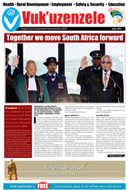
Together we move South Africa forward
Together we move South Africa forward sadminPresident Jacob Zuma has promised to work hard to put South Africa on the path of prosperity and success during his second term in office.
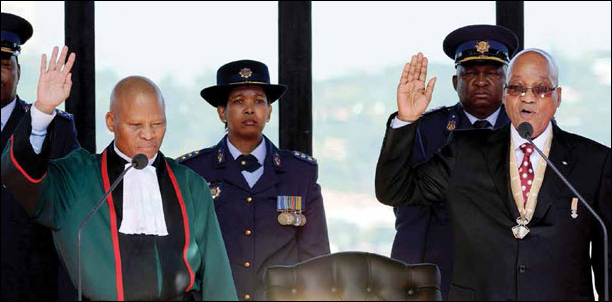 Speaking shortly after his inauguration, the President said radical socio-economic transformation policies and programmes would mark the next five years.
Speaking shortly after his inauguration, the President said radical socio-economic transformation policies and programmes would mark the next five years.
He was confident the result of these would be a growing inclusive economy, which creates jobs and provides opportunities for all, especially the youth.
President Zuma took the Oath of Office to serve the country for a second term at the official swearing in ceremony in front of 4 500 guests gathered at the Nelson Mandela Amphitheatre and the more than 20 000 celebrating below on the Southern Lawns of the Union Buildings.
President Jacob Zuma’s Inauguration Speech as the fifth President of the Republic of South Africa, Union Buildings, Pretoria, 24 May 2014
I am greatly honoured to stand before you today, to accept the mandate bestowed upon us by millions of our people, to lead this great nation for the next five years. I accept this responsibility and privilege with great humility, given the history of our country and where we come from as a nation.
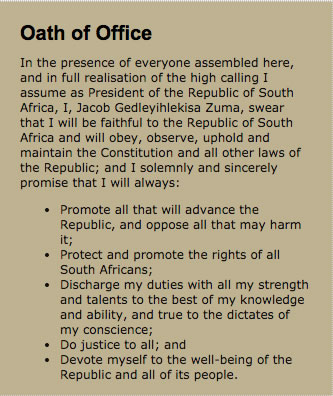 Ours is a nation that has produced generations of selfless freedom fighters, who made untold sacrifices, so that we could live in a country that is free of racial discrimination and oppression. This is a nation that has worked tirelessly to build a new society from the ashes of apartheid, opting for reconciliation and progress instead of retribution.
Ours is a nation that has produced generations of selfless freedom fighters, who made untold sacrifices, so that we could live in a country that is free of racial discrimination and oppression. This is a nation that has worked tirelessly to build a new society from the ashes of apartheid, opting for reconciliation and progress instead of retribution.
This year we mark 20 Years of Freedom, and 20 years since President Nelson Mandela took the Oath of Office at this very Amphitheatre. We began building a new society, based on fundamental human rights, equality,unity in diversity and the promotion of the dignity of all. The democratic government set out to implement policies and programmes that would change the quality of life of all, especially the poor and workers.
A lot of progress has been made.
Basic services
Millions of our people now have access to basic social services and an improved quality of life, which they did not enjoy before the dawn of freedom. Today we wish to acknowledge the contribution of every South African to the process of renewal, reconstruction and development of this country in the past 20 Years of Freedom.
It is through your hard work, that we are able to count so many achievements in only 20 Years of Freedom. However, our work is not yet completed. Last year we conducted a frank formal Review of progress made in the past 20 years of democratic rule.
The Review indicated that South Africa is a much better place to live in now than before 1994, due to the transformative policies of our democratic government. At the same time, the Review also confirmed that while the lives of millions of people have improved, poverty, inequality and unemployment still persist. The reversal of the legacy of apartheid colonialism will require more intense efforts from all South Africans.
We have successfully completed the first phase of transformation.
Second phase
 Today marks the beginning of the second phase of our transition from apartheid to a national democratic society. This second phase will involve the implementation of radical socio-economic transformation policies and programmes over the next five years.
Today marks the beginning of the second phase of our transition from apartheid to a national democratic society. This second phase will involve the implementation of radical socio-economic transformation policies and programmes over the next five years.
We have already placed before the nation, the National Development Plan (NDP), our road map which outlines the type of society we envisage by the year 2030. Through this programme, we will move South Africa forward to prosperity and success. At a social level, as outlined in the NDP, our vision is to develop communities where households will have access to housing, water, electricity, sanitation, safe and reliable public transport, health, education, security, recreational facilities, a clean environment and adequate nutrition to count a few.
Economic transformation will take centre-stage during this new term of government as we put the economy on an inclusive growth path. As the NDP outlines, the structure of the economy will be transformed through industrialisation, broad-based black economic empowerment and through strengthening and expanding the role of the state in the economy.
Development
State owned enterprises and development finance institutions will become engines of development, complementing the State in promoting inclusive economic growth. We have made some progress in changing the ownership and control of the economy, but much more work must still be done.
In this regard, we will improve the implementation of the employment equity and black economic empowerment laws during this term. Land restitution and redistribution and other forms of empowerment will also be better executed in the new term of government.
Our economic transformation programme also reaffirms our commitment to promoting local companies, entrepreneurs and cooperatives through local procurement by the state and its agencies.
Infrastructure
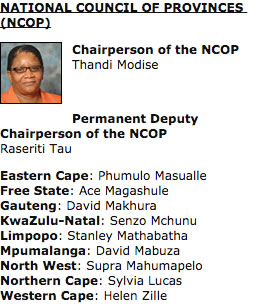 The NDP also prioritises the national infrastructure development programme.
The NDP also prioritises the national infrastructure development programme.
We will continue to build schools, railways, ports, universities, clinics, colleges, power stations, broadband, roads and more infrastructures around the country. This programme will continue to be the flagship of government.
The end result of all these transformative economic programmes is a growing inclusive economy which creates jobs and provides opportunities for all, especially the youth.
With regards to safety and security, our vision is to ensure that by 2030, people living in South Africa should feel completely safe at home, at school and at work at any given time.
Compatriots,
To enable us to achieve these key objectives, the performance of the state will need to improve.
Key targets in this regard will be to eradicate corruption and inefficiency in the public service.
We will promote productivity within the public service and ensure much tighter accountability, with firm consequences where there is a failure to deliver services to our people.
Compatriots,
We have a lot of work to do. We will need the backing of a united and cohesive nation behind us as we move South Africa forward. In this regard, government will promote nation building programmes to rebuild the soul of our nation. Many South Africans still bear the emotional scars arising from decades of apartheid divisions and hatred.
Reconciliation
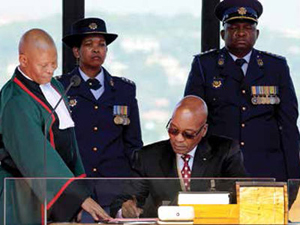 Therefore, the national healing and reconciliation process has to continue. We will work together to promote unity, understanding and tolerance across race and colour lines, as we build a South Africa that truly belongs to all.
Therefore, the national healing and reconciliation process has to continue. We will work together to promote unity, understanding and tolerance across race and colour lines, as we build a South Africa that truly belongs to all.
Excellencies,
Our country will also continue to play its role in the continent and abroad.
Our vision is that of a South Africa that is a key promoter and contributor to sustainable development, democracy, the rule of law, human rights and peace within the continent. We will continue to champion African growth, development and prosperity through supporting regional integration, intra-Africa trade and the development of infrastructure. Our participation in various multilateral institutions such as the United Nations, G20 and special forums such as BRICS, will continue, aimed at promoting a fairer and more just world.
Excellencies,
Let me again express my deep gratitude as I accept this mandate.
We do not take this confidence bestowed upon us lightly. We are truly humbled and will do all in our power to build a South Africa in which all citizens will have a sense of belonging and hope for a brighter future. We invite all our people to work with us as we implement the NDP. I hereby commit the fifth democratically elected administration to serve our people with humility, commitment and dedication.
Ubuntu
We will strive to build a caring society and to be an administration that will serve our people with courtesy, Ubuntu and efficiency. The road ahead is long and demanding. The challenges ahead may seem insurmountable, but we are determined to succeed, as we have always succeeded in our efforts to overcome challenges. We must succeed in honour of Nelson Mandela, Oliver Tambo, Walter Sisulu, Dorothy Nyembe, Solomon Mahlangu, Braam Fischer and indeed all our illustrious leaders who laid the foundation for a non-racial, non-sexist, united and prosperous South Africa.
Fellow South Africans,
We truly appreciate the respect you have displayed!
We assure you that the new government will work diligently to improve the lives of all our people, especially the poor, the needy as well as the working class.
Together, let’s move South Africa forward. I thank you.
Huge crowds witness the Presidential Inauguration
Huge crowds witness the Presidential Inauguration sadminForeign and National dignitaries who came to witness the inauguration of President Jacob Zuma included Heads of State and/or Government, Vice-Presidents/Deputy Heads of State, Prime Ministers, and former Heads of State and/or Government.

The Union Buildings in Pretoria was abuzz with around 20 000 excited members of the public who gathered at the Southern Lawns to witness the Inauguration of President Jacob Zuma.
Tumile Mvubu from Klerksdorp, said he was excited about what the next five years would bring.

“The whole speech was impressive as it had lots of promises, but I was mostly impressed with the commitment to put in effective officials and remove the ones who are not working. If this could happen, we will definitely see an improvement in service delivery,” said Mvubu.
Mvubu said he was glad the President mentioned that government would continue to ensure that people have access to basic services.

“I’m happy that the programmes are still among the top priorities in the new administration.”
Matsepo Mofokeng from Ivory Park in Johannesburg was most impressed by President Zuma’s commitment to promote local companies, entrepreneurs and cooperatives.
“This will be helpful, especially for us who rely on piece jobs.

If government allocates more money towards small business it will create more jobs for us to feed our families,” said Mofokeng.
The crowd was entertained by various artists, including Zahara, Chomee, Yvonne Chaka Chaka, the Soweto Gospel Choir, Kurt Darren, The Soil, Selaelo Selota, Mango Groove, Uhuru and Rebecca Malope.

Yinde lendlela: The journey travelled by President Zuma
Yinde lendlela: The journey travelled by President Zuma sadminThe President of the Republic of South Africa, President Jacob Gedleyihlekisa Zuma, was born on 12 April 1942 at KwaNxamalala in Nkandla, northern KwaZulu-Natal.
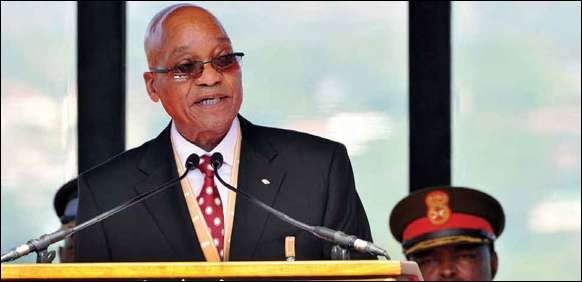 His early political consciousness was shaped by his cousin, Muntukabongwa Zuma, who had fought in the Second World War and later joined the trade union movement and the African National Congress (ANC) in Durban. The young Jacob Zuma was drawn into the organisation and attended its meetings in Mkhumbane (Cator Manor).
His early political consciousness was shaped by his cousin, Muntukabongwa Zuma, who had fought in the Second World War and later joined the trade union movement and the African National Congress (ANC) in Durban. The young Jacob Zuma was drawn into the organisation and attended its meetings in Mkhumbane (Cator Manor).
The President joined the ANC Youth League and the South African Congress of Trade Unions in 1959. The 1950s were characterised by the Defiance Campaign, the adoption of the Freedom Charter during the Congress of the People held in Kliptown in 1955, the anti-pass campaigns and the historic 1956 Women’s March on the Union Buildings.
This was also a decade of the implementation of the most brutal, ruthless and draconian apartheid laws, including the Suppression of Communism Act and the Group Areas Act, as well as the first of a series of treason trials, including the 1956 Treason Trial.
President Zuma was recruited into Umkhonto We Sizwe by the stalwart of the liberation struggle, the late Moses Mabhida and participated in sabotage operations in KwaZulu-Natal. He was arrested in June 1963 near Zeerust in present-day North West. On 12 August 1963, he was sentenced to 10 years’ imprisonment on Robben Island. He was only 21 years old when he began serving his sentence. He was released from Robben Island Maximum Security Prison in 1973.
Robben Island became a university to him in the true sense of the word, as he continued receiving his political education as well as general education with the help of his comrades.
The struggle continues in exile
During his period in exile, President Zuma was based in Swaziland and Mozambique, where he led most of his outstanding operations.
In 1977 he was appointed to serve in the Maputo Regional Committee, and in the same year, was also co-opted as a member of the ANC National Executive Committee (NEC), while at the same time he also began working for the SACP. In 1978, he completed a three-month leadership and military training course in the then Soviet Union.
In 1984, President Zuma was appointed the Deputy Chief Representative of the ANC, and later as Chief Representative of the ANC, and remained in Mozambique. He was re-elected to the ANC’s NEC at the Kabwe Conference in 1985. He also served on the ANC’s Politico- Military Council after its formation in the mid-80s, and the Intelligence Department at the ANC Head Office in Lusaka, Zambia.
When the ANC began to talk to the apartheid regime in the 1980s President Oliver Tambo selected Mr Zuma and former President Thabo Mbeki to execute this task.
The NEC selected President Zuma to lead the compact advance group that came into the country to prepare for the commencement of Talks-about-Talks after the release of former President Mandela and the unbanning of political organisations by the last President of the white minority-based Republic, Mr FW de Klerk, in 1990.
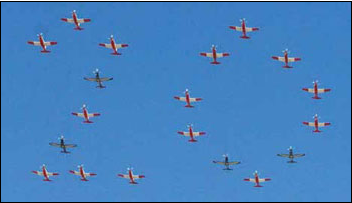 In November 1990, President Zuma was elected Chairperson of the ANC’s Southern Natal region. In 1991, at the first ANC conference held in South Africa since 1959, he was elected Deputy Secretary-General, serving under the current ANC and South Africa’s Deputy President, Mr Cyril Ramaphosa, who was Secretary-General at the time.
In November 1990, President Zuma was elected Chairperson of the ANC’s Southern Natal region. In 1991, at the first ANC conference held in South Africa since 1959, he was elected Deputy Secretary-General, serving under the current ANC and South Africa’s Deputy President, Mr Cyril Ramaphosa, who was Secretary-General at the time.
During this period violence was still continuing in KwaZulu-Natal and the then PWV area (now Gauteng). The apartheid state security forces led a sustained and brutal covert campaign against the ANC and allied organisations in KwaZulu-Natal and Gauteng.
His strategic thinking and conflict resolution skills played a pivotal role in ending conflict in KwaZulu-Natal and Gauteng.
In 1994 he was appointed MEC of Economic Affairs and Tourism for the KwaZulu-Natal provincial government.
As MEC, Mr Zuma worked hard to develop the tourism industry in the province and facilitated new investments into the KwaZulu-Natal economy.
In December 1994, he was elected National Chairperson of the ANC. An exception was made in the ANC Constitution to allow him to serve as both Provincial Chairperson and National Chairperson.
Empowering youth
Empowering youth sadminYouth matters
Over the past 20 years government has stepped up efforts to educate the country’s youth and develop their skills.
 Through the National Youth Development Agency (NYDA) - the agency created by government to tackle challenges facing the country’s youth - more than 2.2 million young people have received some form of assistance to date.
Through the National Youth Development Agency (NYDA) - the agency created by government to tackle challenges facing the country’s youth - more than 2.2 million young people have received some form of assistance to date.
The agency, which was established by President Jacob Zuma in 2009, is the result of a merger between the National Youth Commission (NYC), which was established in 1996 and the Umsobomvu Youth Fund (UYF), established in 2001. Both the NYC and UYF focused on skills development, job creation and small business development for youth.
Despite these efforts, millions of young people remain unemployed and are not furthering their studies. According to the Twenty Year Review released by the Presidency, challenges such as poverty, inequality, unemployment, poor health and social ills such as teenage pregnancy and violence are the reasons behind the country’s high unemployment rate.
To tackle these challenges, the NYDA shifted its focus from enterprise finance to education and skills development, in May last year.
Since 2009, the NYDA has launched a number of campaigns aimed at improving the lives of youth by creating jobs, providing training opportunities, bursaries and business mentorship programmes, among others.
Grant Programme
Through the Grant Programme, the agency offers young entrepreneurs and youth cooperatives grants, ranging from R1 000 to R100 000.
The Grant Programme gives young entrepreneurs an opportunity to access both financial and non-financial business development support to establish their new businesses.
About R25 million has been allocated to the Grant Programme to help enterprises in 2013.
NYDA-Sefa-IDC GRO-E partnership
In 2013, the Industrial Development Corporation (IDC) and the Small Enterprise Finance Agency (Sefa) partnered with the NYDA to help young entrepreneurs through a R50 million youth fund.
The initiative aims to provide funding and support services to youth-owned businesses.
Youth between the ages of 18 and 35, who own their own business or plan to start one, can apply for funding from the IDC, NYDA or Sefa. Through the partnership young business owners receive professional coaching, mentoring and assistance from all three institutions.
NSC 2ND Chance Programme
The National Senior Certificate (NSC) 2nd Chance Programme, launched in 2011, gives young people who failed matric a second chance to get their National Senior Certificate.
The programme is as a result of a partnership between the NYDA and the Education Training Development Practitioner Sector Education Training Authority (ETDP SETA).
According to the NYDA, 4 500 youth will rewrite their Grade 12 exams at the end of 2014.
As part of the programme, learners receive tuition, career guidance and job preparedness training.
Solomon Mahlangu Scholarship Fund
About 250 young people from disadvantaged areas across the country are furthering their studies after being awarded bursaries through the Solomon Mahlangu Scholarship Fund.
The NYDA and the Department of Higher Education and Training each contributed R10 million to the fund, which is named after the late struggle icon Solomon Kalushi Mahlangu, who was executed under apartheid laws at the age of 23.
The fund covers all the costs of the beneficiaries’ studies including tuition, books, meals and accommodation. Bursaries will be allocated every year.
Limitless Youth Campaign
The Limitless Youth Campaign, launched in 2012, aims to encourage a positive mind set among the country’s youth.
It is a call to action to young people to have a ‘get up and go attitude’ by making use of the programmes and resources offered by the NYDA, private sector, government and civil society.
The campaign is a creative, informative way of interacting with young people through initiatives such as edutainment programmes in communities using performances, exhibitions and prizes.
Celebrating SA’s young people
Celebrating SA’s young people sadminYouth matters
Annually, the month of June is dedicated to South Africa’s young people and is a time to reflect on where we come from as a nation and the great sacrifices that were made.
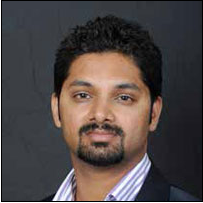 On 16 June 1976 young South Africans stood up against apartheid laws in Soweto and united in protest against the Afrikaans Medium Decree of 1974, which pronounced Afrikaans as the teaching medium for all schools. In the process many lost their lives.
On 16 June 1976 young South Africans stood up against apartheid laws in Soweto and united in protest against the Afrikaans Medium Decree of 1974, which pronounced Afrikaans as the teaching medium for all schools. In the process many lost their lives.
The youth of 1976 could not access state scholarships or entrepreneurship grants nor could they participate in international exchange programmes organised by government. However, they had a vision of a free and democratic South Africa.
It is this vision and the fruits of it that we celebrate as government during our 20 Years of Freedom campaign this year. South Africa is a better country today because of the sacrifices made by so many youth of the past.
Between 2002 and 2012 about 30 million young South Africans received some form of product or service, which included career guidance, loans, vouchers, mentorship, job placements, bursaries or scholarships from government.
About 1.4 million poor students were able to access higher education as a result of the National Student Financial Aid Scheme (NSFAS) and 6.1 million youth are currently employed, earning an income to support their basic needs and live a decent life.
Achievements
The National Youth Development Agency (NYDA) has not been around for 20 years but in the five years we’ve been in existence we have provided business mentorship to 3 932 young people. We have also created 73 920 jobs, provided career guidance services to more than 1 million young people and handed out more than 110 bursaries.
The current NYDA board can look back on the past year, since its appointment by President Jacob Zuma, with pride. In the past year alone the NYDA has delivered 675 Entrepreneurship Grants to youth owned micro-enterprises, over 250 scholarships through the Solomon Mahlangu Scholarship Fund and provided career guidance to over 794 000 young people, among many other successes.
While there is much to celebrate we must also acknowledge the seriousness of challenges the youth of South Africa face.
These challenges include the international scourge of youth unemployment, education and skills development, economic inclusion and issues related to health and well-being.
This requires a multi-pronged approach that involves broadening opportunities and choices for young people. It also requires specific interventions with job creation being the most pressing matter facing young people today.
Youth Employment Accord
The Youth Employment Accord signed in April 2013 by government, organised labour, business as well as community and youth formations, represents just that.
The accord aims to make a meaningful contribution to the creation of five million jobs by 2020 and will provide practical, meaningful results if all stakeholders play their part.
This Youth Month, I encourage all South Africans to celebrate the great strides we have made as a country in the past 20 years.
Today we have an agency that is located in the Office of the President focused on developing products, services and programmes for the youth of South Africa. Today millions of youth have access to education and skills development programmes.
Today young South Africans are changing the world by seizing opportunities that government has made available to them. Today we are proud to be South African. In time we will shape a better world of social justice and social equality for all.
As chairperson of the NYDA, every day for me is Youth Day and so it should be for everyone who needs to rally behind the youth of today.
*Yershen Pillay is the NYDA’s executive chairperson.
Youth take centre stage
Youth take centre stage sadminYouth matters
South Africa will commemorate Youth Day on 16 June, marking the 38th anniversary of the 1976 youth uprising.
On 16 June 1976 more than 20 000 pupils from Soweto began a protest march for better education.
In the wake of clashes with the police and the violence that followed during the next few weeks, approximately 700 hundred people, many of them youths, were killed and property destroyed. One of those killed on 16 June was Hector Pieterson.
The 2014 Youth Day commemorations take place at a time when the country celebrates 20 Years of Freedom.
This year’s event will take place in Kimberley, Northern Cape, where President Jacob Zuma is expected to address the crowd.
Key issues expected to be highlighted on the day include the role of young people in the struggle for freedom, challenges facing the youth, how to overcome these, government programmes for youth development and how the youth can access these.
Youth agency helps SA’s youngsters succeed
Youth agency helps SA’s youngsters succeed sadminYouth matters
The National Youth Development Agency (NYDA) is opening doors of economic opportunity for small and medium enterprises owned by young people.
 According to the NYDA’s chairperson Yershen Pillay, over the past five years the agency’s programmes has helped put a dent in the high level of youth unemployment in the country.
According to the NYDA’s chairperson Yershen Pillay, over the past five years the agency’s programmes has helped put a dent in the high level of youth unemployment in the country.
Pillay said the aim of the NYDA was to get young people involved in the economy through a “multi-pronged approach”.
This included introducing tailor made interventions for job preparedness and placement, scholarships for those who excel in school, the Youth Build programme for out-of-school youth, second chance opportunities for matriculants, intensifying the highly successful career guidance programme and business finance grants.
Helping build businesses
Through these initiatives, the youth agency has exceeded its targets and helped young businessman and women build their businesses, he said.
R25 million was set aside for the Grant Programme for the 2013/14 financial year in a bid to turn possibility into reality for young people.
Due to limited resources, the programme cannot guarantee that all young people who walk through the doors of the NYDA’s offices nationwide will receive its support.
With this in mind, the NYDA plans to work with the Industrial Development Corporation (IDC) and the Small Enterprise Finance Agency (Sefa) to ensure that as many young people as possible access the R3 billion funding available to young entrepreneurs.
“We have an obligation as a developmental agency to invest in youth entrepreneurship,” Pillay pointed out.
Another flagship programme of the NYDA is the Youth Build programme.
The NYDA partners with the Department of Human Settlements on a number of programmes to give young people the opportunity to build and renovate Reconstruction and Development Programme (RDP) houses and community amenities.
Through the Youth Build programme, young people acquire practical skills and experience in brick laying, carpentry, plumbing and electrical while contributing to community upliftment.
The NYDA also plans to launch a loxion hub in the Northern Cape this month. It will serve as the business headquarters for a number of local small businesses. The NYDA, in partnership with the Prieska Municipality, secured the premises free of charge for youth entrepreneurs and also provided office equipment.
Pillay said despite these interventions, unemployment remained a concern.
Going forward South Africa’s public and private sectors, as well as young people, needed to work together to tackle unemployment, he said.
“If you involve all these stakeholders in youth development initiatives and encourage them to invest more, the NYDA then plays a coordinating function.
“Through a multi-pronged approach, we could be reaching that 3.2 million young people who are currently not in any institution of higher learning or unemployed,” he said.
Making young dreams a reality
Making young dreams a reality sadminYouth matters
Thanks to the National Youth Development Agency’s (NYDA) Grant Programme, business is booming for 26-year-old Bahlakoana Moleko, a farmer in De Deur, Gauteng.
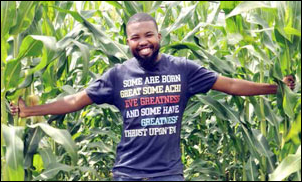 Moleko, who runs Yea Media Farmer Fresh, grows spinach and Chinese vegetables on his 10 hectare farm, which he supplies to Chinese markets and restaurants across the province.
Moleko, who runs Yea Media Farmer Fresh, grows spinach and Chinese vegetables on his 10 hectare farm, which he supplies to Chinese markets and restaurants across the province.
Needing a proper irrigation system for his crops, he approached the NYDA and recently received a grant of R49 000 from the programme. This allowed him to invest in a new irrigation system as well as netting, tools and fencing to keep his crops safe from wandering cattle.
To boost his business, Moleka plans to apply for further funding from the IDC-Sefa-NYDA partnership.
The Industrial Development Corporation (IDC), Small Enterprise Finance Agency (Sefa) and NYDA partnership aims to increase access to finance for youth-owned businesses.
Moleka wants to buy more land and build a pack house where his vegetables can be stored and packaged. “With the pack house I will be able to supply large supermarkets with frozen vegetables,” he said.
Despite not having a formal qualification in agriculture, Moleko honed his skills after watching neighbouring farmers and being mentored by them.
He learnt to farm Chinese vegetables by watching videos on YouTube and interacted with suppliers at Chinese markets in Johannesburg.
Currently he employs five people, however with more land, he will be able to harvest more crops and create more jobs.
Gro-E Youth Scheme
Three Port Elizabeth friends are also taking their business to new heights, with the help of the Gro-E Youth Scheme, an initiative of the IDC-Sefa-NYDA partnership.
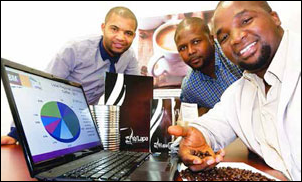 Roland Jordaan, Knight Mali and Mbuleli Kral, of Ya Lapa Coffee, applied for IDC funding for their business last year and received R8 million from the scheme in September.
Roland Jordaan, Knight Mali and Mbuleli Kral, of Ya Lapa Coffee, applied for IDC funding for their business last year and received R8 million from the scheme in September.
After much research, the trio identified a gap in the coffee industry and now supply coffee to local businesses.
“South Africa imports more coffee than it exports when our lands are actually suited to growing coffee. There also aren’t many businesses, if any, providing a basket of options to retailers and supermarkets,” said Jordaan.
During their research, the friends also found that coffee, a multi-billion rand industry and the world’s second largest traded commodity after petrol, can be grown in the Eastern Cape.
To help produce and source more locally grown coffee beans, Jordaan, Mali and Kral partnered with several rural farms and community cooperatives in the province to grow coffee there.
As a result, Ya Lapa now produces its own gourmet range of coffees and instant coffee, which it supplies to businesses across the country.
Solomon Mahlangu Scholarship Fund
For Isaac Mashego, of Gauteng, the possibility of going to university was always just a dream, until he became one of about 250 beneficiaries of the Solomon Mahlangu Scholarship Fund.
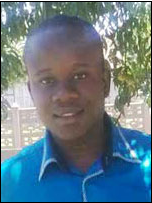 The fund, launched recently by President Jacob Zuma, gives youth from disadvantaged areas the chance to further their studies at tertiary institutions across the country. It was set up by the NYDA in partnership with the Department of Higher Education and Training, with each contributing R10 million to the fund.
The fund, launched recently by President Jacob Zuma, gives youth from disadvantaged areas the chance to further their studies at tertiary institutions across the country. It was set up by the NYDA in partnership with the Department of Higher Education and Training, with each contributing R10 million to the fund.
Mashego, who has eight siblings, knew the chances of him furthering his studies were bleak.
“My mother is unemployed and my father works as a driver for a mining company. There was no way my parents could afford the fees so the only way I was going to study was through a bursary or scholarship,” said the 19-year-old.
In matric, he worked hard and applied for every bursary he came across.
Mashego’s application for Solomon Mahlangu Scholarship Fund was successful and he is currently a first year electrical and electronic engineering student at the University of Johannesburg.
“I am so happy that I finally have the power to change not only my but my family’s future as well. Classes are going well. It is a lot of hard work but I am up for the challenge,” he added.
For more information on these programmes contact the NYDA on 0800 525 252 or visit www.nyda.gov.za
Equipping rural youth for success
Equipping rural youth for success sadminNew hope and opportunities are coming to the country’s rural landscape, with the National Rural Youth Service Corps (Narysec) set to speed up the development path of these areas by fighting unemployment.
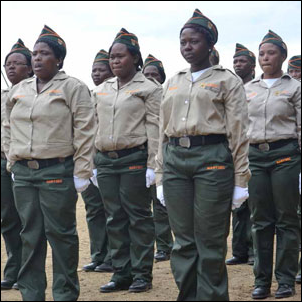 Recently, 6 000 young people from the Narysec programme at Thaba Nchu College of Education in the Free State – a moment Rural Development and Land Reform Minister Gugile Nkwinti described as a turning point in rural life.
Recently, 6 000 young people from the Narysec programme at Thaba Nchu College of Education in the Free State – a moment Rural Development and Land Reform Minister Gugile Nkwinti described as a turning point in rural life.
“In the coming years, we will be talking about a changed and different rural (life) in South Africa. It is equally reasonable to predict that because our intervention of skilling and creating employment for our young people in our rural areas through Narysec is bearing fruit,” he said.
Narysec is an important skills development programme that is transforming young people in the rural areas from being job seekers to being job creators, breaking the vicious cycle of social grant dependency.
The then Deputy Minister in the Presidency: Performance, Monitoring and Evaluation, Obed Bapela, noted the programme’s role in roping in young people from the fringes of economic activity.
“The Presidency is the developer of youth policies in the country. Narysec is indeed becoming an intervention programme taking young people, who are unskilled and unemployed in the rural areas, and giving them a second opportunity to be able to get the necessary skills to either seek employment or start their own entrepreneurial opportunities.
“It is a very good programme and it has been supported and sustained. We hope that other departments will develop their own programmes that are similar to Narysec to [counter the] challenge of youth skills development,” he said.
Narysec: a brief history
The Department of Rural Development and Land Reform launched Narysec in 2011 to give opportunities to rural youth between the ages of 18 - 35 by equipping them with skills such as plumbing, farming, game ranging, electricity and animal husbandry.
The learning programmes are linked to the economic priorities in the respective provinces of the youth service corps, who also go through extensive workplace practical training. This is a requirement for qualification as an artisan.
The future leaders also undergo character development and leadership training at the South African National Defence Force for four months after being recruited into the programme.
The participants are then expected to do community service in their communities.
Minister Nkwinti said to date, about 14 000 youngsters had been enrolled in the department’s long-term programme. In 2012, the recruitment drive for the youth programme was increased to six youth per rural ward, with an emphasis on the Comprehensive Rural Development Programme (CRDP) sites, where the numbers are more than 10 youth per CRDP site.
The participants in Narysec were also given opportunities when they completed training through the Rural Enterprise Industrial Development (REID) programme, which aims to build sustainable rural economies.
At the graduation ceremony of the 6 000 youth, Free State Premier Ace Magashule handed over Thaba Nchu College of Education to the Department of Rural Development and Land Reform.
The college has now become the headquarters of the Narysec programme in the country and will also be used as the permanent exhibition centre of the 1913 Land Act Exhibition.
Rural youth thrive on skills programme
Rural youth thrive on skills programme sadminA graduate of the National Rural Youth Service Corps (Narysec), Colbert Mabasa, has hailed the programme as a skills development hub, which creates invaluable job opportunities for the youth.
“My life has changed because of the construction and agricultural skills that I’ve acquired through the programme. I value this programme and I can see the difference it is making to young people’s lives, mostly in rural areas.
“I know how to build, plaster and make roofing. Before I started with this programme in 2010, I was unemployed and unskilled,” he said.
Mabasa currently builds houses for people in the Mukhomi village near Malamulele in Limpopo and has a registered construction company, which employs five locals.
He is one of the 6 000 young people who recently graduated from the Narysec programme aimed at empowering rural youth from each of the 3 300 rural wards across the country.
Mabasa, who runs a two-hectare garden where he plants vegetables such as spinach, cabbage and onions, sells his produce to local Shoprite and Pick ’n Pay stores.
“I’ve been sitting doing nothing at home since I matriculated in 2008, as there was no money for me to further my studies; my results were also not good. But now this programme has changed my life for the better and I’m always working very hard so that I can also change the lives of other young people in my village,” he said.
Wendy Tsotetsi, from Emfuleni in Gauteng, has also seen the benefits of Narysec.
“This is a very good initiative, which needs young people with a positive mind-set. Young people should stay out of the streets and grab opportunities like this one, which has been created by government to change their lives.”
Narysec was launched by the Department of Rural Development and Land Reform in 2011 with an initial 7 900 participants, of which 4 500 have completed training in various disciplines, mainly in the construction sector.
For information on Narysec contact the department on 0800 007 095
Faces of Government 2014
Faces of Government 2014 sadminA new National Executive has been appointed to take South Africa forward under the leadership of President Jacob Zuma.
Following South Africa’s fifth democratic elections, 35 ministers and 37 deputy ministers have been sworn into office, along with the country’s new Deputy President Cyril Ramaphosa.
The members of the National Executive boast a wealth of experience with some ministers retaining their positions, while new ministers and deputy ministers have also been appointed.
President Zuma also announced the creation of new ministries in a bid to transform the economy, tackle youth unemployment and promote rural development. Some departments have changed, while others have combined.
“To improve implementation and ensure impact, we have reconfigured some departments while others have been expanded to improve capacity,” the President explained.
“We have established a Ministry of Telecommunications and Postal Services. Our country has a fast growing telecommunications sector, which in 2012 was estimated at being worth R180 billion. We also see a great developmental value in the Post Office given its role of delivering financial services to remote areas of our country.
“This new department will ensure that the country derives more value out of the booming information communications and technology industry and the postal services sector. “The National Planning Commission as well as the Performance Monitoring and Evaluation Ministries in the Presidency have been combined into one Ministry to harmonise the planning and monitoring functions. This Ministry will also continue to be responsible for youth development.
“We have established a new Communications Ministry, which will be responsible for overarching communication policy and strategy, information dissemination and publicity as well as the branding of the country abroad. Improved communication and marketing will promote an informed citizenry and also assist the country to promote investments, economic growth and job creation.
“This Ministry will be formed out of the following components;
- The Independent Communications Authority of South Africa (ICASA)
- The SA Broadcasting Corporation (SABC)
- Government Communications and Information System (GCIS)
- Brand SA and
- The Media Development and Diversity Agency (MDDA).
“The functions related to support for people with disabilities and children, will be transferred to the Department of Social Development. The current Ministry of Women, Children and People with Disability is now the Ministry of Women, which will be located in the Presidency. The Women’s Ministry will champion the achievement of women’s socioeconomic empowerment and women’s rights.
“To further improve efficiency in the criminal justice system, we have combined the Department of Justice and Constitutional Development with the Correctional Services department. The Department will now be called the Department of Justice and Correctional Services.
“We have made an undertaking to significantly improve the provision of water and sanitation to our communities in the new term. In this regard, we have established the Ministry of Water and Sanitation.
“… we stated in the inauguration address that the economy will take centre-stage. The development of the small business sector is critical to economic development and transformation. We have thus established a new Ministry for Small Business Development,” President Zuma said, before announcing the names of the ministers and their deputies.
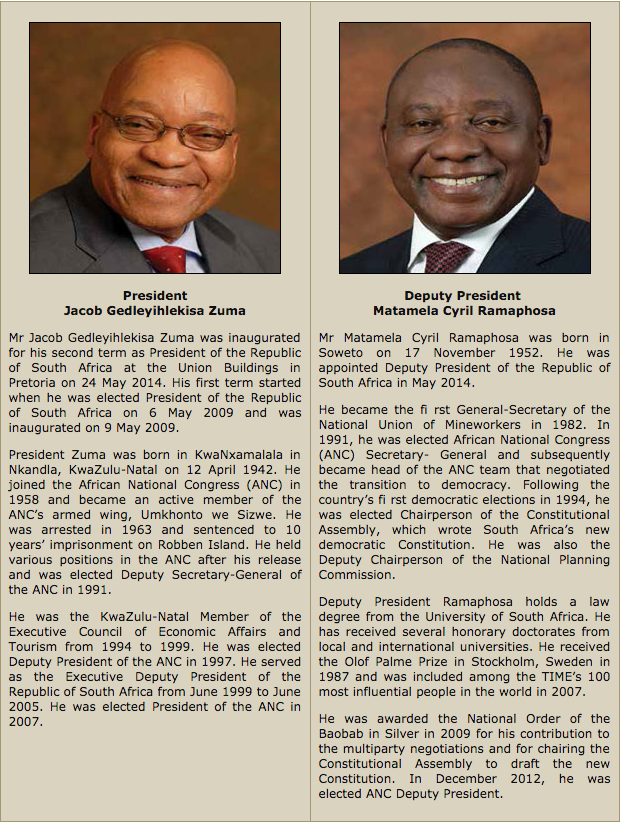
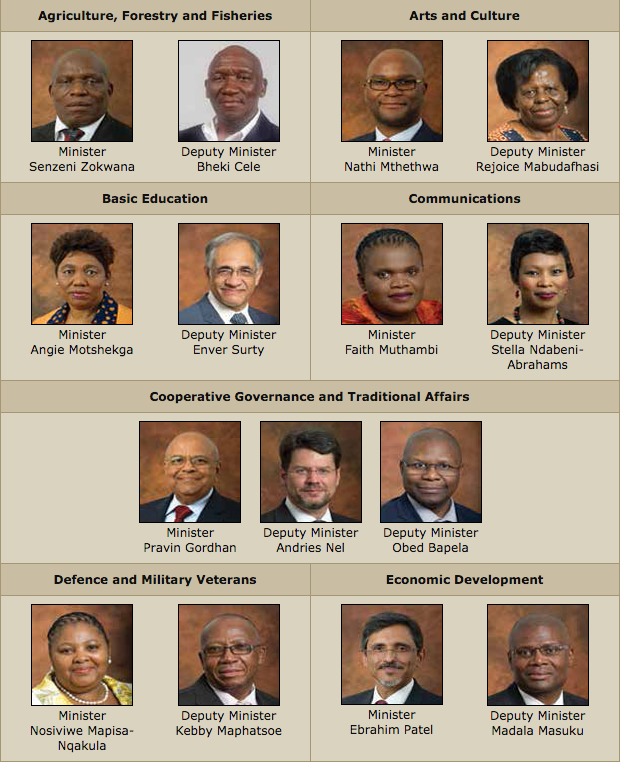
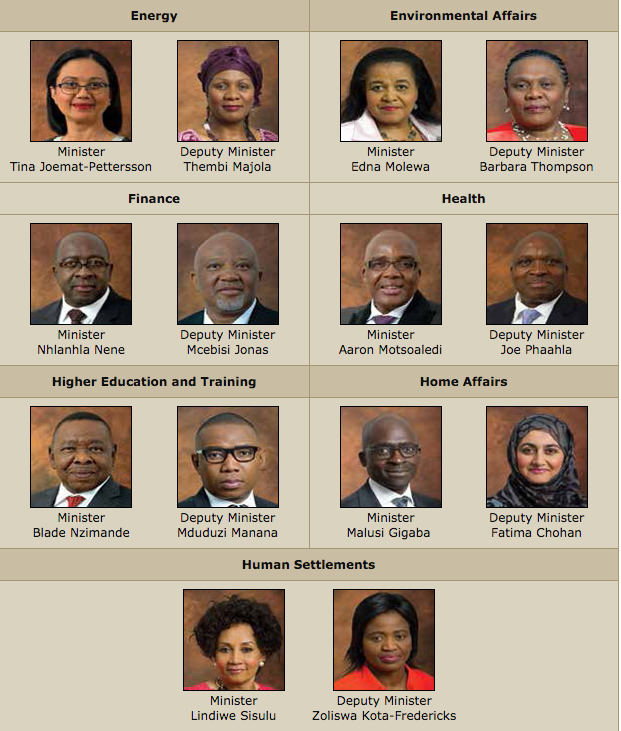
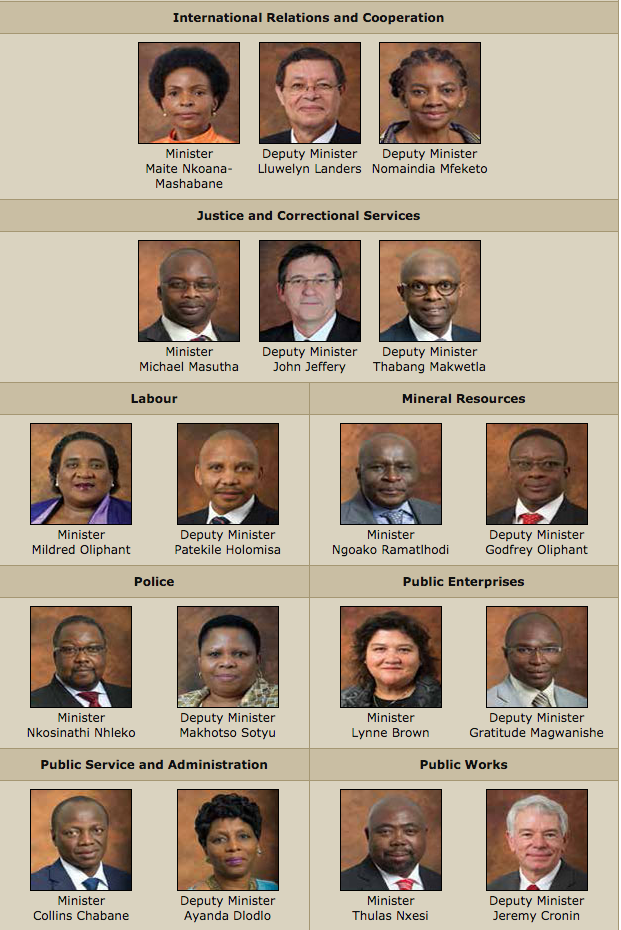
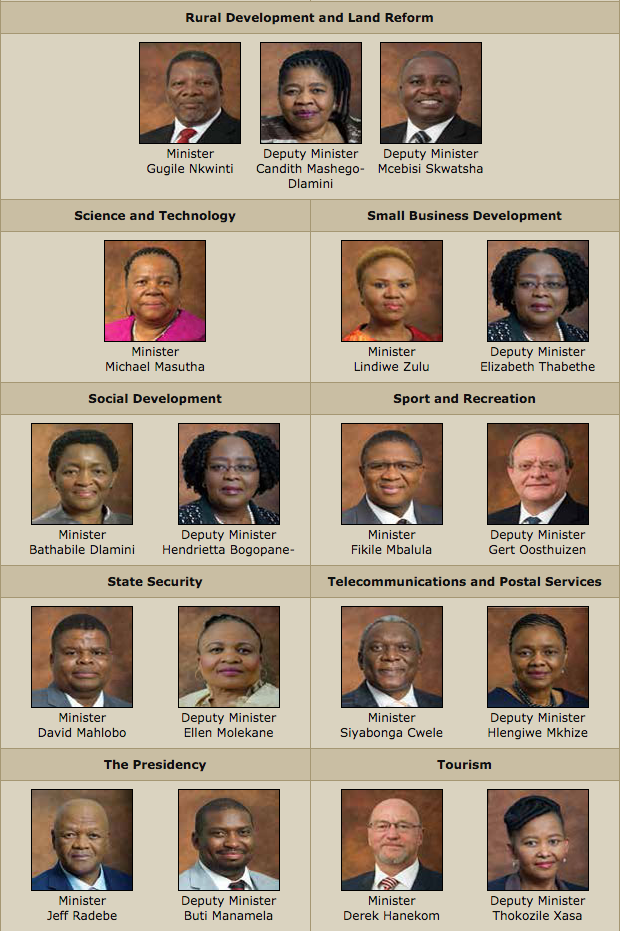
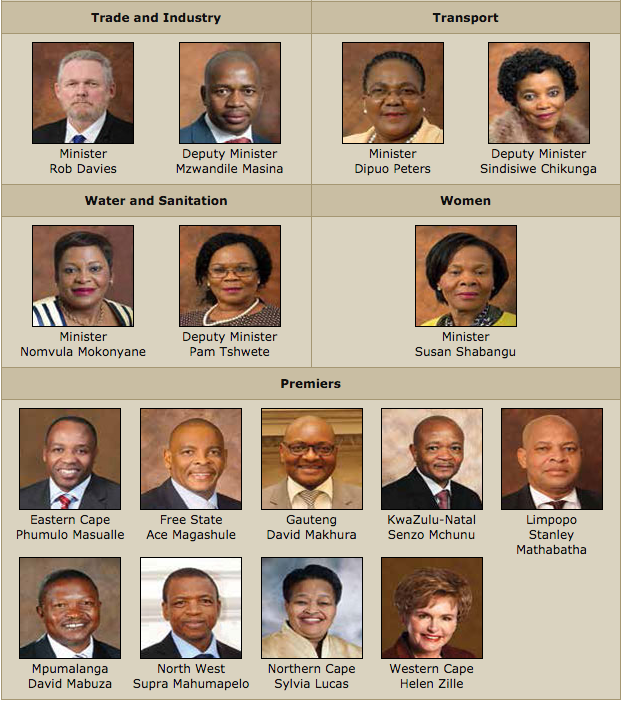
Govt projects support young dreams
Govt projects support young dreams sadminYouth matters
Young people in South Africa have a number of avenues available to them to gain skills, start businesses and better their lives.
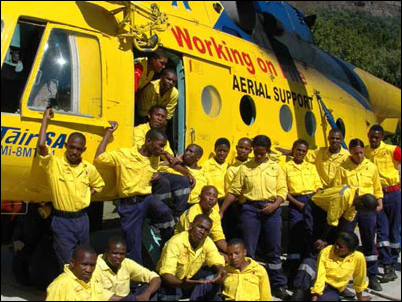 Government led initiatives such as Sector Training and Education Authorities (SETAs), the National Youth Development Agency (NYDA), the Expanded Public Works Programme and the National Rural Youth Service Corps (NARYSEC) are all aimed at opening doors of opportunity for the country’s youth.
Government led initiatives such as Sector Training and Education Authorities (SETAs), the National Youth Development Agency (NYDA), the Expanded Public Works Programme and the National Rural Youth Service Corps (NARYSEC) are all aimed at opening doors of opportunity for the country’s youth.
Working for Water
Working for Water (WfW) is an Expanded Public Works Programme that provides training for youth in the environmental sector. The project sees over 20 000 youth clearing invasive alien plants across the country each year. WfW runs over 300 projects in all nine provinces. For more information contact WfW on 021 441 2700 or 0800 005 376.
Working on Fire
Working on Fire (WoF) is part of government’s initiatives to create jobs and to alleviate poverty. The project employs more than 5 000 young men and women who have been fully trained as veld and forest fire fighters and are stationed in more than 200 teams throughout South Africa. WoF teaches fire prevention and control of wild land fires. For more information contact WoF on 013 741 6400.
NYDA
The NYDA offers a number of programmes that provide funding, business support, training workshops, scholarships and grants to young people. For information of any of these programmes, contact the NYDA call centre on 0800 52 52 52 or visit your nearest NYDA branch.
NARYSEC
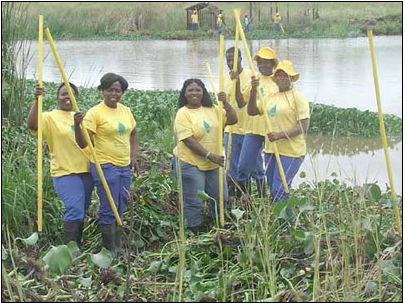 NARYSEC is a service established by the Department of Rural Development and Land Reform aimed at recruiting and developing rural youth to perform community service in their communities. For more information on NARYSEC, contact the national coordinator Nonala Buthelezi 012 312 8151 or visit www.dla.gov.za
NARYSEC is a service established by the Department of Rural Development and Land Reform aimed at recruiting and developing rural youth to perform community service in their communities. For more information on NARYSEC, contact the national coordinator Nonala Buthelezi 012 312 8151 or visit www.dla.gov.za
SETAs
SETAs are training bodies that provide young job seekers with practical training and prepares them for the world of work. SETAs were set up to narrow the gap between available skills and the job market. Each year thousands of young graduates seek employment and more than 50 per cent of Grade 12 learners leave schools without basic employment skills.
To address the huge skills gap facing the country and to improve skills development, in March 2000 the then Minister of Labour Membathisi Mdladlana formerly established 23 SETAs.
Each SETA has its own clearly defined sector and sub-sectors. The SETAs are also very involved with learnerships, internships, skills programmes and apprenticeships.
One of the primary objectives of SETAs is to collect skills levies from employers in each sector, in terms of the Skills Development Levies Act, and make the money available for education and training in that sector.
These funds are allocated to employers, training bodies and learners, in the form of optional grants and bursaries.
FASSET
Financial and Accounting Services Sector Education and Training Authority.
tel: 011 476 8570, fax: 011 476 5756, www.fasset.org.za
BANKSETA
Banking Sector Education and Training Authority.
tel: 011 805 9661, fax: 011 805 8348, www.bankseta.org.za
CHIETA
Chemical Industries Education and Training Authority.
tel: 011 726 4026, fax: 011 726 2425, www.chieta.org.za
FP & M SETA
Fibre Processing Manufacturing Sector Education and Training Authority.
tel: 011 234 2311, fax: 011 234 2350, www.fpmseta.org.za
CETA
Construction Education and Training Authority.
tel: 011 265 5900, fax: 011 265 5924/5, www.ceta.org.za
ETDP
Education, Training and Development Practices.
tel: 011 372 3300, 0866 048 934, www.etdpseta.org.za
EWSETA
Energy Sector Education and Training Authority.
tel: 011 689 5320, fax: 011 689 5340/5341, www.eseta.org.za
FOODBEV
Food and Beverages Manufacturing Industry Sector Education and Training Authority.
tel: 011 253 7300, fax: 011 253 7333, www.foodbev.co.za
HWSETA
Health and Welfare Sector Education and Training Authority.
tel: 011 607 6907 fax: 011 616 7393, www.hwseta.org.za
INSETA
Insurance Sector Education and Training Authority.
tel: 011 544 2000, fax: 011 484 0862, www.inseta.org.za
LGSETA
Local Government Sector Education and Training Authority.
tel: 011 456 8579 fax: 011 450 4948, www.lgseta.co.za
MICT
Media, Advertising, Information & Communication Technologies Sector Education & Training Authority,
tel: 011 207 2600, fax: 011 805 6833, www.isett.org.za
MQA
Mining Qualifications Authority.
tel: 011 630 3503, fax: 011 832 1044, www.mqa.org.za
MERSETA
Manufacturing, Engineering and Related Services Sector Education and Training Authority.
tel: 011 484 9310, fax: 011 484 9319, www.merseta.org.za
SASSETA
Safety and Security Sector Education & Training Authority.
tel: 011 347 0200, 0861 102 477, www.sasseta.org.za
AGRISETA
Agriculture Sector Education and Training Authority.
tel: 012 301 5600, fax: 012 325 1677, www.agriseta.co.za
PSETA
Public Service Sector Education and Training Authority.
tel: 012 314 7045/7133, fax: 012 314 7152, www.pseta.gov.za
SSETA
Services Sector Education and Training Authority.
tel: 011 276 9600, fax: 011 276 9650, www.serviceseta.org.za
CATHSSETA
Culture, Arts, Tourism, Hospitality and Sport Education and Training Authority.
tel: 011 217 0600, fax: 011 783 7745, www.cathsseta.org.za
TETA
Transport Education and Training Authority.
tel: 011 781 1280, fax: 011 781 0200, www.teta.org.za
W & R SETA
Wholesale and Retail Sector Education and Training Authority.
tel: 012 622 9500 fax: 012 665 2559, www.wrseta.org.za
President Zuma hails E Cape’s achievements
President Zuma hails E Cape’s achievements sadminFrom infrastructure to education, health and job creation, government has a good story to tell, President Jacob Zuma has told residents of Port Elizabeth in the Eastern Cape.
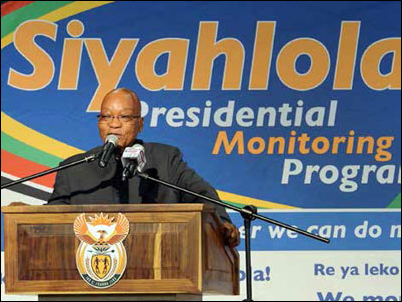 “We have our challenges but we also have our successes. We have made inroads in changing the lives of our people and developments here in the Eastern Cape are a proof of the work that all spheres of government have been doing,” President Zuma said during a Siyahlola Presidential Monitoring visit.
“We have our challenges but we also have our successes. We have made inroads in changing the lives of our people and developments here in the Eastern Cape are a proof of the work that all spheres of government have been doing,” President Zuma said during a Siyahlola Presidential Monitoring visit.
The President runs the Siyahlola Presidential Monitoring Programme through which he assesses the performance of government at national, provincial and local levels.
During his visit before the 7 May elections, he was accompanied by at least seven Cabinet members.
Last year, national government began providing support to the Nelson Mandela Bay Municipality to improve governance systems. The then Finance Minister Pravin Gordhan and then Cooperative Governance and Traditional Affairs Minister Lechesa Tsenoli met with the municipal leadership in August last year and agreed on a set of short term support measures.
The President’s recent activities in the Eastern Cape also included meetings with provincial and local government leaders, the business sector and civil society.
Job creation
The then Eastern Cape Premier Noxolo Kievet told President Zuma that more than 5 000 jobs were created at the Port of Ngqura alone.
In 2012, President Zuma officially opened the Port of Ngqura and it has since become Africa’s premier trans-shipment hub, linking the world’s east and west trade routes. The port recently overtook Cape Town as the second busiest container terminal in Africa. It will be further developed in the next few years and more jobs will be created.
Health
President Zuma also heard that the Eastern Cape Department of Health had over the past five years renovated hospitals and built new clinics. This included the revitalisation of Cecilia Makiwane Hospital in East London.
More than 600 nurses were trained by the Ilitha College, while R32 million was spent on a rehabilitation centre situated in Port Elizabeth’s KwaDwesi township.
Investments
The Department of Trade and Industry spent more than R1 billion in investment incentive schemes in the Eastern Cape over the past three years. Minister Rob Davies said these were aimed at encouraging investments in the automotive sector and the Coega Industrial Development Zone (IDZ).
Government also committed its support local manufacturing through policy initiatives such as the New Growth Path. As a result of this commitment, companies like Aspen Pharmacare expanded its operations in the Eastern Cape.
Investor confidence in the Coega IDZ, which is South Africa’s biggest IDZ, has continued to grow, with six new investors committing to the IDZ in the second half of 2012 and new investments injecting R1.7 billion into the Eastern Cape economy in 2012/13.
The President promised to return to the Eastern Cape to listen to the community’s concerns about service delivery.
Cornubia restores dignity for home owners
Cornubia restores dignity for home owners sadminMore than 400 people are now proud home owners, thanks to the R25 billion Cornubia Integrated Human Settlements Development Project in KwaZulu-Natal.
Phase 1A of the project has provided homes to 482 people in Ottawa, north of Durban.
Cornubia was launched by President Jacob Zuma as part of government’s initiative to integrate society by delivering decent housing and improving the lives of all South Africans.
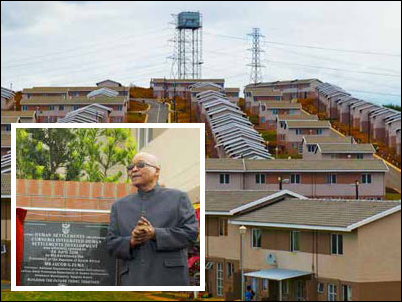 “South Africa indeed has a good story to tell,” said President Zuma at the launch, which coincided with the country celebrating 20 Years of Freedom.
“South Africa indeed has a good story to tell,” said President Zuma at the launch, which coincided with the country celebrating 20 Years of Freedom.
Cornubia, said President Zuma, was a result of the successful public-private partnership between the national and provincial Department of Human Settlements, eThekwini municipality and Tongaat Hulett Development.
Once completed, the project will boast 28 000 mixed-income housing units, light industrial factories, clinics, two primary schools, a high school, businesses and parks.
Mobile clinics are also providing residents with health services until the new clinics are built.
“A total of 15 000 of the homes will be subsidised or low income houses,” said President Zuma.
Cornubia will cost government R25 billion over 25 years and show government’s commitment to provide houses for all South Africans, regardless of race.
“I am hopeful that with integrated human settlement projects like Cornubia, we will be able to effectively eradicate a significant number of the informal settlements across various areas in eThekwini and across South Africa,” said the President.
The project is expected to create 48 000 new sustainable job opportunities over a period of 15 years and a further 15 000 during the construction phase.
President Zuma pointed out that residents of Cornubia would also benefit from the new state-of-the-art Bus Rapid Transport (BRT) system. The BRT routes would link Cornubia to surrounding areas like Umhlanga, Phoenix, the Dube Trade Port and the nearby King Shaka International Airport.
The first phase of Cornubia provides houses to residents from surrounding informal settlements, which include Blackburn, Stonebridge, Ridgeview and transit or waiting camps in Clermont.
One of the beneficiaries is 66-year-old Lucy Xaba, who moved into her new home in November last year.
After spending five years in Lindela, a waiting camp in Waybank, Clermont, Xaba finally has a proper roof over her head. Her husband, who was a construction worker, died a few years ago and since then she has been selling potatoes to support herself.
“Life has been tough for me but I am happy today because my suffering has come to an end. I never expected that I would ever live in a place like this,” said Xaba.
Living in Cornubia, also provides an income for 51-year-old Inderlal Mothilal, his wife Mominbibi and their two children. The couple earn a living by running a tuckshop in Cornubia, where residents can buy bread, milk and other essentials.
Just a few doors down is the Muthia family. After 46 years of marriage, James and Sally Muthia finally have a home of their own. Originally from Blackburn village - an old slum near Phoenix, the couple’s garden is the talk of Cornubia.
“My new home is my pride and joy that is why I take pride in my garden,” said James Muthia.
Mother of three, Zanele Cele, enjoys living in a Cornubia’s mixed community.
Cele, 26, shares a house with her children and parents Zozwane Ngcobo and Eunice Cele, who are both unemployed.
The family moved to Cornubia after living in a one-room shack in a transit camp in Clermont.
“We now have so much space and a bathroom. It is really a different life than we are used to and we love it.
“Living with people of mixed races is very nice. We learn a lot about different cultures and Cornubia is how South Africa should be, one big happy, mixed family,” said Zanele.
Construction of Phase B is underway and promises another 2 100 homes, costing around R560 million.
Over the past 20 years, government has provided homes for 12 million South Africans.
SAPS declares war on drug lords
SAPS declares war on drug lords sadminPolice are stepping up the fight against drugs in the country and has declared war on drug lords.
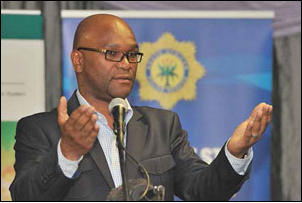 The then Police Minister Nathi Mthethwa has ordered senior SAPS officers to intensify investigations into major drug lords throughout the country.
The then Police Minister Nathi Mthethwa has ordered senior SAPS officers to intensify investigations into major drug lords throughout the country.
The Minister has identified Chatsworth and Phoenix in KwaZulu-Natal, Eldorado Park and Lenasia in Gauteng, parts of the northern areas suburbs of Port Elizabeth in the Eastern Cape and Mitchells Plain in the Western Cape as areas where police face serious problems in dealing with drug crimes.
“The illegal drug trade is big and violent. Drug lords are evil people, who simply do not care that they are destroying the lives of South African youngsters. They even recruit children to do their dirty business for them, so that they can remain hidden in the shadows,” said Minister Mthethwa.
The Police Ministry is tightening the screws on drug dealers as part of government’s National Drugs Master Plan.
Minister Mthethwa said the National Drug Master Plan recognises that drug use is a catalyst for crime, poverty, reduced productivity, unemployment, dysfunctional family life and premature death, among others.
“Government now has a comprehensive strategy in place focused on better education, job creation and improved living standards. It is a broad-based strategy that includes rehabilitation programmes by the Social Development Department, intervention on health related effects of drugs by the Department of Health and collaboration with appropriate non-government organisations,” he said.
In the Western Cape and Eastern Cape, tik (methamphetamine) is a serious problem and in Gauteng and KZN, nyaope (also known as ‘whoonga’ or ‘sugars’) poses serious health risks to users. Nyaope is a highly addictive mixture of cocaine and heroin, often mixed with rat poison and ARVs.
Minister Mthethwa said the drug master plan includes search and seizures, targeting certain individuals for intense investigation and ensuring adequate deployment of police in affected areas.
“Good community policing includes getting users off the street and hopefully into rehabilitation centres. But I have instructed SAPS that greater emphasis must be put on arresting and charging major drug figures,” said the Minister.
In the Western Cape, where gangsterism and drugs are interlinked, Operation Combat (a 100-strong unit) has had major successes in the recent months. Life sentences have been handed to prominent figures in the Fancy Boy and 28s gangs, with others being jailed for shorter terms. Other major drug lords are under investigation.
Gauteng has formed specialised teams that are currently investigating five separate cases around major drug figures. Similar teams exist in other provinces. In KwaZulu-Natal, police have adopted a multidisciplinary approach involving Crime Intelligence, detectives and the Hawks, specifically to investigate drug lords. Another major focus is on drugs that enter through ports of entry in KZN, Limpopo and Mpumalanga.
“The police have already played a major role but I believe they must now take the fight to the big fish and deal with them with the full weight of the law,” he added.
Minister Mthethwa urged those with knowledge of drug dealing to pass this information to police.
“Crime intelligence is vital if we are to catch the drug lords. Making our communities drug-free is something we need to work on together,” he said.
Nyaope users, dealers face jail time
Nyaope users, dealers face jail time sadminPeople found in possession of or dealing in nyaope could face a lengthy prison sentence after the highly addictive mixture was recently declared an illegal drug.
Nyaope is a mixture of cocaine and heroin, often mixed with rat poison and anti-retrovirals (ARVs).
The then Justice Minister Jeff Radebe and Health Minister Dr Aaron Motsoaledi recently signed off on the amendment to the Drugs and Trafficking Act, which makes nyaope illegal.
The amendment to the Act means that those dealing in or in possession of nyaope, or other altered drugs can be prosecuted, said Justice spokesman Mthunzi Mhaga.
For many years prosecutors struggled to take legal action in cases involving nyaope, as it was not classified as an illegal drug.
According to Mhaga, thanks to the new amendment courts can now impose a fine or jail term for use and possession nyaope of up to 15 years, and up to 25 years for dealing in it.
Mhaga explained that the amendments were not just limited to nyaope but were also designed to include all other drug mixtures, which may surface in the future.
“We hope that crimes related to these drugs like nyaope will decrease. We are dealing not just with users of the drugs but with dealers too,” he said.
Community members have been urged to join in the fight against drug abuse by reporting drug related activities to the police.
Call the police crime-stop tip-off line on 08600 10111 or SMS Crime Line on 32211 with any information.
Police beef up crowd management training
Police beef up crowd management training sadminPolice will be better equipped to deal with protests after more than 900 Metro Police officers and members of the Tactical Response Team (TRT) were recently trained in crowd management.
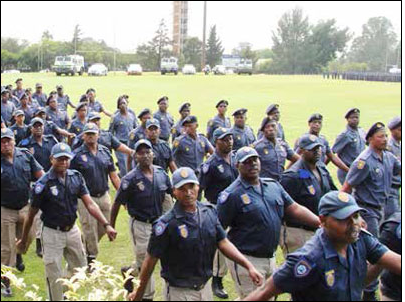 The 946 officers graduated from a three-week course on the importance of crowd management.
The 946 officers graduated from a three-week course on the importance of crowd management.
Speaking at the passing-out parade for officers who attended the training, the then Police Minister Nathi Mthethwa said the country had experienced an increase in protest action and unrest.
“In some instances this has been accompanied by serious provocation, intimidation, public violence and even elements of criminality,” he noted.
To deal with such situations, officers were taught how the Constitution and the Bill of Rights impact on crowd management, laws related to crowd management, the importance of negotiation tactics, as well as strategy and tactics to be used in crowd management.
Minister Mthethwa said the Police Ministry wanted to ensure that training related to public order policing was constantly improving.
The training that the graduates received was aligned with the training of police working at Public Order Police units.
“Based on this training it is our sincere hope that both the Metro Police and TRT members who have attended this training will now be able to work side-by-side with Public Order Police members.”
The newly trained members will return to their units and will be able to be deployed as a support system to Public Order Police units when necessary.
“Our duty is to make South Africa a safe place for every person. This means that we must ensure our policing doesn’t contribute to tension during protests; and that policing does not generate the very violence it seeks to control during public protests,” the Minister added.
He added that SAPS and Metro Police were being trained at the same time to ensure that all law enforcement agencies work together during public order policing.
This training programme aims to provide additional training to SAPS and Metro Police in crowd control and is part of a broader goal of professionalising the public order policing.
“From now on all new SAPS members will undergo basic crowd management training as part of their basic training,” the Minister said.
Taung Agricultural College gets cash injection
Taung Agricultural College gets cash injection sadminTaung Agricultural College’s efforts to develop the country’s agricultural industry and fight poverty have received a major boost thanks to a US $1 million (about R 10 million) donation.
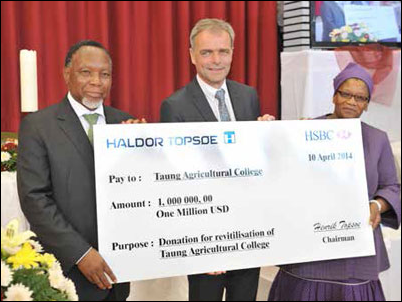 Danish company Haldor Topsøe, which specialises in research and technology, recently made the donation to the North West college as it strives to become a centre of excellence in irrigation technology.
Danish company Haldor Topsøe, which specialises in research and technology, recently made the donation to the North West college as it strives to become a centre of excellence in irrigation technology.
The then Deputy President Kgalema Motlanthe, who attended the event, urged the college to use the money to equip students and teachers to educate communities about the importance of preserving nature.
“Nature is very important for the production of food in this country,” the Deputy President noted.
He also thanked the Danish company for its contribution.
“The South African Government is humbled by Haldor Topsøe’s gesture and we are confident that this donation will be used for a good cause.”
North West Premier Thandi Modise, who accompanied the then Deputy President while he inspected some of the projects on the campus, said agriculture was a key driver of the provincial economy and employed a large number of people.
“The donation will go a long way towards training aspirant farmers and ensuring food security in the battle to alleviate poverty,” said the Premier.
Haldor Topsøe representative Helge Rosenberg said the company was pleased to be associated with Taung Agricultural College as it shared the same vision.
“We share the same enthusiasm and innovation of making an input into agriculture. We are happy that the team of management at the college has a clear vision and is very committed to innovative training and curriculum,” said Rosenberg.
The company’s involvement with the college would provide many opportunities for the students, Rosenberg added.
The college’s principal, Pepenene Serage, welcomed the donation, saying it would help the college achieve its goal of becoming a centre of excellence in irrigation technology.
Taung Agricultural College offers a range of specialised programmes developed to meet the needs of the agricultural industry and help fight poverty.
The college has just been re-accredited by the Council on Higher Education (CHE) to offer a NQF level 6 Diploma in Agriculture specialising in Irrigation Technology.
The college also received an additional R30 million from government, allocated for infrastructure development projects.
Applications for Nguni cattle project open
Applications for Nguni cattle project open sadminFarmers in the North West, who have an interest in breeding livestock, have been urged to take advantage of the Nguni Cattle Development project.
The project was started by the provincial Department of Agriculture and Rural Development in partnership with the Industrial Development Corporation (IDC) and the North West University. It aims to re-introduce indigenous Nguni cattle to the livestock industry, empower subsistence farmers with livestock farming skills and help small-scale farmers boost their businesses.
Successful applicants will each receive 24 Nguni cattle, which include 23 heifers and a bull.
Farmers will also have to sign a contract to commit to the project conditions for five years.
At the end of the five years beneficiaries will return 11 heifers and one bull but will keep the remaining livestock, including any offspring from the herd, as a grant from the department.
Interested farmers must fill out an application form, which is available at all the department’s District Offices and Local Development Centres. The closing date to submit applications is 30 June 2014.
Criteria
- All applicants must have at least 350 hectares of fenced grazing land with water available to accommodate livestock.
- Applicants must be in possession of certified proof of land or farm ownership.
- Applicants will undergo a selection process, which will include physical interviews, an on-site visit by the project’s technical committee and verification of information provided.
Since the project started in 2007, 1 632 heifers, 65 bulls and 675 calves have been distributed to small-scale farmers. Of these, 216 have been returned to the project and re-distributed to new beneficiaries.
North West MEC for Department of Agriculture and Rural Development Desbo Mohono said R16.2 million had been allocated to the project over the years.
For more information call the North West Department of Agriculture and Rural Development on 018 389 5111.
Cattle project a lifeline for farmers
Cattle project a lifeline for farmers sadminLivestock farmers in Mpumalanga received a boost when the provincial Department of Agriculture, Rural Development and Land Administration loaned them cattle.
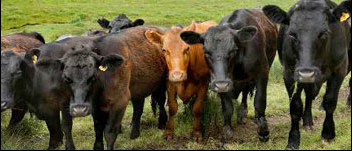 MEC Violet Siwela handed over 30 pregnant Nguni heifers and one bull to the Nhlapho Livestock Project in Machadodorp as part of the department’s Masibuyele Esibayeni (back to the kraal) programme.
MEC Violet Siwela handed over 30 pregnant Nguni heifers and one bull to the Nhlapho Livestock Project in Machadodorp as part of the department’s Masibuyele Esibayeni (back to the kraal) programme.
She urged the emerging livestock farmers to make good use of the cattle they received.
“Please take good care of the cattle so that they can multiply. By doing so, you will be able to return the loan…When we come back to the farm, we must find more cattle because livestock is not like a car; it does not depreciate annually but multiplies because the bull is here,” said MEC Siwela.
The Masibuyele Esibayeni Nguni cattle programme was introduced in 2011 by the department, in partnership with the Industrial Development Corporation (IDC) and the University of Limpopo. The aim of the project is to improve food security, community upliftment and address the shortage of good quality breeding animals in the province.
MEC Siwela said the programme also addressed agrarian reform as part of government’s Zero Hunger Strategy.
Nhlapo Livestock Project chairman Ara Nhlapo said livestock farming was his childhood dream that came true.
“I have always seen myself as a livestock farmer. When I was a boy, I enjoyed being a herd boy and today I am very thankful that we are part of this programme. We can assure the department that next time they visit us, there will be no space in the kraal because the cattle would have multiplied,” said Nhlapo.
The department’s project manager, Theo Ngemtu, said the programme loaned cattle to farmers for three years or five years.
“Those who apply for small stock have three years to return the loan and those who apply for large stock have five years to return the loan,” he explained.
For farmers to participate in the programme they should have at least 150 hectares of land or at most 350 hectares available to accommodate livestock numbers at the recommended rate.
Ngemtu said the department also provided the farmers with skills and trains them in the use of natural resources.
“We strongly believe that with the support that they receive from veterinarians and other role players, the farmers will achieve their dream of becoming commercial farmers,” he added.
Beating the pull of cigarettes
Beating the pull of cigarettes sadminLindiwe Rasasamola was a smoker for 22 years. She kicked the habit last year and says her life has changed for the better.
The reason she started smoking was due to peer pressure and wanting to fit in.
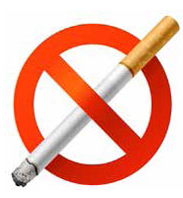 “As teenager I started singing and entered the entertainment industry. The people around me made smoking seem like a way of life. I think I must have been 14 years old when I took my first puff,” said the 36-year-old, from Turffontein in Gauteng.
“As teenager I started singing and entered the entertainment industry. The people around me made smoking seem like a way of life. I think I must have been 14 years old when I took my first puff,” said the 36-year-old, from Turffontein in Gauteng.
Rasasamola started off smoking four cigarettes a day and before she knew it moved on to about 20 a day.
As the years went by Rasasamola started to feel as if her habit was controlling and consuming her.
“If I did not get a cigarette I would be edgy and short tempered. Eventually I got tired of being dependent on a cigarette. It was time to quit.”
Her breath, nails and hair would also smell of cigarettes, she added.
Rasasamola became more determined to quit smoking after doing a short course when she decided to become a health care worker.
“I got to see people who had cancer as part of my practical and this scared me. I was consumed with regret, wondering why I was smoking but kicking the habit was so difficult. I also thought to myself that I was lucky that I was not sick yet.
“At times I would ask myself what would happen when I am 60 years old. Would I now crawl out of the house just for a cigarette? This made me scared.”
She said quitting was a challenge and for more than a year she thought of what life would be like without a cigarette.
Rasasamola kept the National Council Against Smokers’ (NCAS) details ready for the day she would finally be ready to say goodbye to her cigarettes. That day came on 15 January 2013, when she woke up and made a conscious decision to stop smoking.
“I took the first step when I dialled the number and told the person at NCAS that I didn’t want to smoke but I wanted a cigarette.” She said that the first week was a struggle to get through.
“I would lock myself in the house. I could smell a cigarette from a distance, it was so difficult... I had to deal with withdrawal symptoms. I would cough, choke and at times I couldn’t breathe. I constantly felt sick and I struggled to sleep. The first seven days were a nightmare.”
Despite the initial difficulties, Rasasamola stayed strong and did not turn back.
“I have won my battle against cigarettes and I feel lighter and happier. In my community I have become an advocate against smoking. I know what it can do to you and I know that anyone can quit.”
She encourages every smoker to quit. “Smoking affects your health and spending your life dependent on a cigarette is not a nice way to live,” warned Rasasamola.
With World No Tobacco Day commemorated on 31 May, Vuk’uzenzele asked the NCAS for advice on how to stop smoking.
Tips from the NCAS include:
- Set yourself a date for quitting. On Quit Day throw away your ashtrays, cigarettes and lighter.
- Call the Quit Line on 011 725 1514 for professional advice. Also get support from your family, friends and your doctor. Having someone to talk to helps.
- Find out what triggers your craving for a cigarette – is it stress, alcohol use, etc. Find a way to deal with the triggers.
- If you are craving a cigarette do something to help you cope. Drink water, it will wash the nicotine out of your body. Deep breathe - fill your lungs with air and breathe out slowly. Do this four or five times. It will help you relax. Remember a craving usually lasts for 3-5 minutes before it disappears so take it one craving at a time.
- Start eating healthily. Snack on a carrot, apple, prune, radish or sugarless gum and avoid fatty foods.
- Take it one day at a time. The withdrawal symptoms start to improve after a few days and most disappear within 10 days.
- Be positive and confident that you can quit. If you believe you can, you will succeed.
Mandela Day to honour Madiba’s legacy
Mandela Day to honour Madiba’s legacy sadminThis year the world will celebrate International Nelson Mandela Day without the beloved icon who inspired it.
However, according to the Nelson Mandela Foundation the day is now an opportunity to ensure that the late former President Nelson Mandela’s legacy lives on.
Celebrated across the world in honour of the Madiba’s birthday on 18 July, Mandela Day is an international call to bring positive change to communities.
The day aims to empower communities everywhere through the slogan ‘Take Action; Inspire Change; Make Every Day a Mandela Day’.
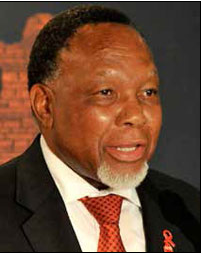 Speaking at the launch of Nelson Mandela International Day 2014, the then Deputy President Kgalema Motlanthe said this year’s campaign would focus on three themes - literacy, shelter and food security.
Speaking at the launch of Nelson Mandela International Day 2014, the then Deputy President Kgalema Motlanthe said this year’s campaign would focus on three themes - literacy, shelter and food security.
“We know that the most vulnerable are those who are going hungry, who have no proper roof over their heads, who cannot read or write. We also know that so many of our people still find themselves in this position of vulnerability.
“This is not only in South Africa, but the world over. It is a global phenomenon and all these shortages limit us as human beings. Nelson Mandela International Day reminds us that to go without basic necessities of life is be robbed of your humanity,” he said.
The then Deputy President said the day should be used to fight poverty and inspire everyone to be a public servant of the people.
“This is the day that inspires all humanity to honour Mandela,” he said, adding that it united the haves and have-nots to work together to build a better world.
“The founding rationale of the campaign is that it should open Madiba’s legacy to interpretation by people all around the world in their own contexts, and that it should open the legacy to application in widely differing contexts.”
He urged individuals and institutions across the world to use any resources they had, to do whatever they could, to address the needs of their communities.
The idea of Mandela Day was inspired by Nelson Mandela at his 90th birthday celebrations in London’s Hyde Park in 2008 when he said: “It is time for new hands to lift the burdens. It is in your hands now”.
The United Nations officially declared 18 July as Nelson Mandela International Day in November 2009, recognising Mandela’s “values and his dedication to the service of humanity” and acknowledging his contribution “to the struggle for democracy internationally and the promotion of a culture of peace throughout the world”.
The Mandela Day campaign asks that individuals, groups and corporates pledge 67 minutes of their time on 18 July and everyday after that to give back.
This can be by supporting a charity or serving the community – no matter how small the action, the aim is to change the world for the better, just as Mandela has.
Mandela’s eldest grandson, Mandla Mandela encouraged South Africans’ to continue with his grandfather’s legacy by doing whatever they could to serve other people.
More learners get their matric
More learners get their matric sadminOver 15 000 learners, who sat for the National Senior Certificate (NSC) supplementary exams, have passed matric.
Basic Education Minister Angie Motshekga recently announced the results of the matric supplementary examinations, which took place from 17 February to 25 March.
According to the Minister, 15 030 more young people have attained the NSC, which gives them what they need to further their studies.
A total of 66 105 candidates sat for the exams at 6 168 centres across the country.
With the release of the supplementary results, the overall national performance from the 2013 matric exams is now at 80.0 per cent, up by 2.6 per cent from 78.2 per cent.
Minister Motshekga said a total of 454 809 candidates successfully attained the NSC from the class of 2013.
“We are proud of the learners who took the decision to again sit for the examinations after their set-back last year during the Grade 12 final examinations.
“Their achievement is testament to the courage, hard work and indeed perseverance,” the Minister said.
There has also been an increase in all categories of pass types, with 1 303 more candidates qualifying for admission to Bachelor Studies; 20 834 more candidates are now eligible for diploma studies and 10 763 more candidates qualifying for admission to Higher Certificate studies.
The latest results mean the pass rate in the provinces increased as follows:
- Eastern Cape from 64.9 to 67 per cent.
- Free State from 87.4 to 88.8 per cent.
- Gauteng 87 to 88.8 per cent.
- KwaZulu-Natal from 77.4 to 80.5 per cent.
- Limpopo from 71.8 to 75.9 per cent.
- Mpumalanga from 77.6 to 80.1 per cent.
- North West from 87.2 to 89 per cent.
- Northern Cape from 74.5 to 77.2 per cent.
- Western Cape from 85.1 to 86.5 per cent.
Govt safeguards vulnerable groups
Govt safeguards vulnerable groups sadminOver the past five years, government has made great strides in protecting vulnerable groups such as women, children and people with disabilities.
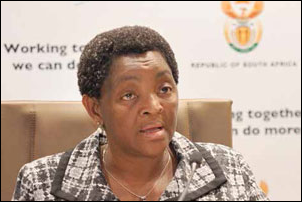 Working together, the Department of Social Development and the then Department of Women, Children and People with Disabilities have helped ensure that the rights and dignity of these groups are protected.
Working together, the Department of Social Development and the then Department of Women, Children and People with Disabilities have helped ensure that the rights and dignity of these groups are protected.
According to the Minister of Social Development Bathabile Dlamini, the democratic government inherited a divided nation, with high levels of poverty and inequality.
In 1994, government started transforming policies and programmes from a racially based welfare system of apartheid to the one that is now inclusive of all people.
“One of the main objectives was to implement measures of social protection for targeted groups such as the elderly, children, people with disabilities and victims of violence and abuse,” she explained.
Since then government has made significant progress in the fight against women and child abuse, alternative care, adoption services, child and youth care services, establishment of the victim empowerment programme and delivering services to people with disabilities.
Child Protection Week is just one of ways the department is raising awareness about the need to care for children, the Minister said.
South Africa commemorated Child Protection Week from 26 May to 1 June. The annual campaign raises awareness about the rights of children.
It started in 1997 and aims to get all sectors of society involved in the care and protection of children.
People with disabilities
Since 1994, South Africa has done well to recognise the rights of people with disabilities.
“Children with disabilities were generally not welcome in ordinary schools prior to 1994. Today, all children between the ages of seven and 15 have to attend school by law and this includes children with disabilities,” said Minister Dlamini.
“Our inclusive education policy makes it clear that children with disabilities should be accommodated in local schools and that they need to be provided with the support they need to learn,” she added.
Gender-based violence
The department’s victim empowerment programme (VEP) forms an important part of government’s goal of protecting the rights of women and children, the Minister said.
The VEP aims to make the criminal justice process more victim-friendly and effective to address the needs of all victims of crime and violence, with special focus on vulnerable groups like women and children, people with disabilities and older persons and victims of human trafficking.
VEP focuses on programmes and services that protect, support and care for victims of crime and violence. VEP also promotes and upholds the rights of victims.
The department in partnership with the Vodacom Foundation and other stakeholders has also a 24 hour Command Centre as a pilot project to assist victims of gender-based violence.
Early Childhood Development
In the past five years, access to Early Childhood Development (ECD) services has broadened significantly. By the end of the 2012/13 financial year, more than one million (1 009 022) children were accessing ECD services throughout the country.
The number of children directly subsidised by the state increased from 432 727 in 2009/10 to more than 545 347 in 2013. The number of registered ECD facilities grew from 16 250 in 2009/10 to 21 023 by the end of 2012/13.
Your adverse credit information and paid up judgment debt listing will be removed from 1 April 2014
Your adverse credit information and paid up judgment debt listing will be removed from 1 April 2014 Estelle GreeffThis is a government initiative called: Removal of Adverse Consumer Credit Information and Information Relating to Paid-Up Judgments announced on 26 February 2014 (Government Gazette Notice No. 37386, “The Notice”).
 This initiative is aimed at providing relief to consumers listed at credit bureaus. The barriers created by a negative credit record created great hardship to consumers, for example, being unable to access employment opportunities, rental accommodation, home loans as well as affordable credit. It gives you the opportunity to start your life on a clean financial slate and maintain a clean credit record going forward.
This initiative is aimed at providing relief to consumers listed at credit bureaus. The barriers created by a negative credit record created great hardship to consumers, for example, being unable to access employment opportunities, rental accommodation, home loans as well as affordable credit. It gives you the opportunity to start your life on a clean financial slate and maintain a clean credit record going forward.
HOW DOES IT WORK:
1. It is a quick and simple process from 1 April 2014 to remove adverse credit information or “listings”.
2. For judgments, you don’t have to approach the court or pay a lawyer to have your name removed. Once you have paid up and provided proof of payment it will be removed within 7 days.
TYPES OF INFORMATION REMOVED:
1. Adverse consumer credit information (such as ‘handed over’, ‘written off’, ‘slow payer’, ‘absconded’, ‘not contactable’ etc.).
2. Information relating to paid-up judgments (such as default judgments where the consumer has paid the judgments).
3. Details and results relating to disputes lodged by consumers.
4. Adverse consumer credit information in the payment profile represented by any mark, symbol or sign or any manner or form.
IMPORTANT NOTE TO CONSUMERS:
1. Once the relevant information is removed, no credit provider may use your adverse credit information again if you are applying for credit. Credit bureaus are not allowed to provide such information to anyone for any reason.
2. You are still responsible to pay your unsettled debt even if your adverse credit information has been removed from your credit bureau record.
TIPS TO CONSUMERS:
1. You are allowed one free credit report a year from each registered credit bureau.
2. You have the right to dispute inaccurate information on your credit record.
3. You have a right to apply for debt counselling when you are over indebted.
4. You must use credit responsibly.
5. You must provide honest and true information when applying for credit.
6. Always pay instalments on time.
7. Start a culture of saving for a rainy day, today.
0860 627 627 - www.ncr.org.za
National Orders – rewarding excellence
National Orders – rewarding excellence sadminEvery year on Freedom Day, 27 April, the President bestows National Orders to carefully chosen South Africans and foreign nationals who have played a part in developing the country.
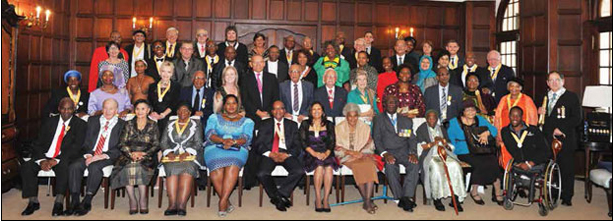 The National Orders are the highest awards that the country, through its President, bestows on its citizens and prominent foreign nationals. They recognise the contributions made by individuals towards building a non-racial, non-sexist, democratic and prosperous South Africa in various ways.
The National Orders are the highest awards that the country, through its President, bestows on its citizens and prominent foreign nationals. They recognise the contributions made by individuals towards building a non-racial, non-sexist, democratic and prosperous South Africa in various ways.
This year, President Jacob Zuma bestowed National Orders to 54 recipients at the Sefako Mapogo Makgatho Presidential Guest House in Pretoria.
Speaking at the National Orders ceremony, President Zuma paid tribute to the heroes who contributed to the liberation of South Africa from apartheid rule.
“Working together, we have achieved a successful transition to a new society and have built a new nation out of the ashes of apartheid divisions.
“We thank all our international guests for your contribution to the achievement of freedom and democracy in our country,” he said.
“We have built a democratic state founded on the values of human dignity, non-racialism, non-sexism, the rule of law and universal adult suffrage as enshrined in the Constitution. We have built strong institutions that continue to support our constitutional democracy.”
The National Orders ceremony celebrates human achievement and is an opportunity to honour men and women who have left definitive footprints in both the struggle for liberation and also in building a better South Africa.
“Today we honour compatriots whose contribution puts the country in the global map be it in sports, the arts, business, science and through humanitarian acts,” said President Zuma.
The categories include the Order of Mendi for Bravery, the Order of Ikhamanga, the Order of the Baobab, the Order of Luthuli, the Order of Mapungubwe and the Order of the Companions of OR Tambo.
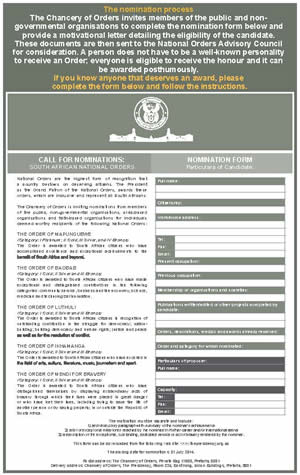 Each recipient was awarded for making a meaningful contribution to the country. For example, Elizabeth Barrett was honoured with the Order of Mendi for Bravery in Bronze for saving 14 children from a burning house.
Each recipient was awarded for making a meaningful contribution to the country. For example, Elizabeth Barrett was honoured with the Order of Mendi for Bravery in Bronze for saving 14 children from a burning house.
Some of the well-known recipients included athlete and Olympic gold medallist Caster Semenya, who received the Order of Ikhamanga for standing firm against prejudice and Olympic gold medallist Cameron van der Burgh, who has also won a number of World Championship medals.
Soccer legend and businessman Jomo Sono also received the Order of Ikhamanga for his contribution to the development of football in South Africa.
“He has excelled as a gifted player, as a coach and a mentor who takes efforts to unearth youth soccer talent,” said President Zuma.
Also on the list was businessman Raymond Ackerman, actor Danny Glover and tennis player Lucas Sithole, who was awarded for proving that it is possible to reach the greatest heights despite physical disabilities.
President Zuma also had a special message for all the recipients of the Order of the Companions of OR Tambo. “We would like to give you a message from the former ANC President and Nobel Peace Prize winner Chief Albert Luthuli, delivering the Nobel Peace Prize lecture in 1961.”
“He said: ‘Alone we would have been weak. Our heartfelt appreciation of your acts of support for us, we cannot adequately express, nor can we ever forget; now or in the future when victory is behind us.’
“Indeed we shall never forget the solidarity we received from brothers and sisters in the continent and the world,” said President Zuma.
Where it all started
When the democratic government came into power in 1994, a decision was taken to make slight changes to the pre-existing titles of South Africa’s National Orders. This was done to ensure that the awards were a true reflection of a new South Africa committed to non-racism, non-sexism and human rights, while emphasising the importance of recognising the country’s unsung heroes and heroines.
All of the awards are significant and represent a specific industry or particular area of civil service in which the recipient excelled or contributed greatly towards. The recipients of the awards are not necessarily well-known, but are also ordinary people doing extraordinary things.